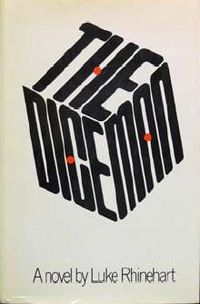- The Dice Man
-
For other uses, see Diceman (disambiguation).
The Dice Man 
1st editionAuthor(s) Luke Rhinehart Country United States Language English Genre(s) Novel Publisher William Morrow Publication date 1971 Media type Print (Hardback & Paperback) Pages 500 p. (paperback edition) ISBN ISBN 0-00-716121-2 (2003 paperback edition) OCLC Number 59367330 Followed by The Search for the Dice Man The Dice Man is a novel published in 1971 by George Cockcroft under the pen name Luke Rhinehart and tells the story of a psychiatrist who begins making life decisions based on the casting of dice. Cockcroft wrote the book based on his own experiences of using dice to make decisions while studying psychology.[1] The novel is noted for its subversivity, anti-psychiatry sentiments and for reflecting moods of the early 1970s. Due to its subversive nature and chapters concerned with controversial issues such as rape, murder and sexual experimentation, it was banned in several countries.[2] Upon its initial publication, the cover bore the confident subheader, "Few novels can change your life. This one will" and quickly became a modern cult classic.[citation needed]
The book went through a number of republishings - in the United States it acquired the even more confident subheader "This book will change your life", in spite of its being a highly edited version of the original.[verification needed] It was initially less successful than in the United Kingdom and Scandinavia.[citation needed]
The themes of the book are continued in two other novels, The Search for the Dice Man and Adventures of Wim and a companion title, The Book of the Die.
Contents
Plot summary
The book tells the story of a psychiatrist named Luke Rhinehart who, feeling bored and unfulfilled in life, starts making decisions about what to do based on a roll of a dice. Along the way, there is sex, rape, murder, "dice parties", breakouts by psychiatric patients, and various corporate and governmental machines being put into a spin. There is also a description of the cult that starts to develop around the man, and the psychological research he initiates, such as the "Fuck without Fear for Fun and Profit" program.
References in popular culture
- Two plays have been produced based on the ideas in The Dice Man: The Dice House, written by Paul Lucas and produced by Neal Foster's Birmingham Theatre Company, and The Six Sided Man by Gavin Robertson.
- The script for Dice, a Canada/UK co-produced TV mini-series directed by Rachel Talalay in 2001, was inspired by The Dice Man.
- The song "Dice Man" by Mancunian band The Fall is inspired by the novel. It can be found on their 1979 LP Dragnet.
- The song "Such A Shame" by Talk Talk was inspired by The Dice Man, which was one of lyricist Mark Hollis' favourite books.
- The song "X, Y & Z" by Pop Will Eat Itself is a reference to a sentence from The Dice Man, in which the main character predicts that there will come a time when a person is considered insane who believes that "I am he who is X, Y & Z, and X, Y & Z only."
- The melodic death metal band At the Gates has quotations from the book in the songs "Blinded by Fear", "Slaughter of the Soul" and "World of Lies" from the Slaughter of the Soul album; the lyricist/vocalist Tomas Lindberg has cited it as a major lyrical inspiration. Anyway, all the album was inspired by this novel, as can be seen on the cover.
- In Quentin Tarantino's segment of the film Four Rooms entitled "The Man from Hollywood", Chester urges Ted the Bellhop to chop off his friend's finger by referring to him as 'The Dice Man'.
- The song "Random I Am" by Swedish Skate Punk band Millencolin is a homage to The Dice Man in which the lead singer is singing from Luke Rhinehart's perspective.
- Electronic music artist Aphex Twin has used the name 'The Dice Man' as an alias for some of his work.
- In episode 19 of Season 2 of Mile High, a drama on Sky One, characters meet a man dressed as a squirrel who is living his life in the diceman manner.
- Mentioned in the Manic Street Preachers' song "Patrick Bateman" ("Travis, Rhinehart rolled into one cute son")
Publishing history
- ISBN 0-900735-00-7 - September 9, 1971
- ISBN 0-246-11058-9 - July, 1978
- ISBN 0-586-03765-9 - April 13, 1989
- ISBN 0-87951-864-2 - July, 1998
- ISBN 0-00-651390-5 - December 15, 1999
- ISBN 0-00-716121-2 - April 7, 2003
References
- ^ Author interview, The Guardian, 27 August 2000 accessed 13-04-09
- ^ Luke Rhinehart - Author
External links
The Dice Man (1971) • Matari (1975) • The Book of est (1976) • Long Voyage Back (1983) • Adventures of Wim (1986) • The Search for the Dice Man (1993) • The Book of the Die (2000)Categories:- 1971 novels
- American novels
- Debut novels
Wikimedia Foundation. 2010.
